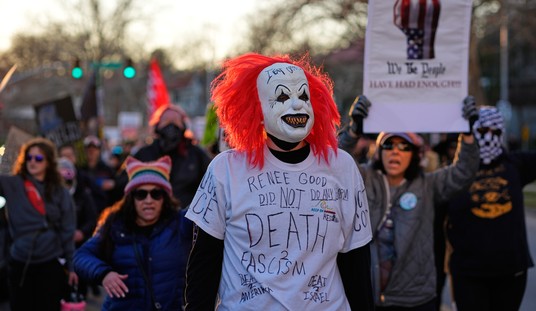In the battle for supremacy among super-beings, who wins? Alien or Predator? The Hulk or the Thing? Vampires or Werewolves? Deep Throat or Wikileaks? Charles Schumer and Diane Feinstein have put their money down on Deep Throat. The New York Times reports on the two Senator’s efforts to create a “media shield” which will protect traditional news media organizations but not Wikileaks.
Senators Charles E. Schumer and Dianne Feinstein, Democrats of New York and California, are drafting an amendment to make clear that the bill’s protections extend only to traditional news-gathering activities and not to Web sites that serve as a conduit for the mass dissemination of secret documents. The so-called “media shield” bill is awaiting a vote on the Senate floor. …
The bill would allow reporters, when faced with subpoenas seeking to compel them to testify about their confidential sources, to ask a federal judge to quash the demand rather than fining or jailing them for contempt of court if they refuse to comply.
This is likely to add to the debate on how much more protection “traditional news-gathering” should have than anyone else. The media has traditionally argued that it is special. For example, the Newspaper Association of America made an argument in 2008 before the FTC that “restrictions on advertising technology are tantamount to unconstitutional censorship”. In particular, the newspapers had a right to “follow users around the Internet so it can charge higher prices on advertising.” As a right.
Efforts to restrict or limit what newspaper websites publish, and the basis by which editors and advertisers make decisions regarding what to publish, run directly counter to core First Amendment rights, and can amount to a form of prior restraint.
In general anything which hampers the media industry is viewed as an attack on freedom of speech. If anyone is to blame for the rise of Wikileaks, it is those who failed to provide the media with enough protections. Paul Boyle, the senior vice president at the Newspaper Association of America argued that Wikileaks filled a vacuum created by the inability of journalists to protect their sources. Why, journalists faced with subpoenas would naturally enter into alliances of convenience with Wikileaks-type organizations to provide dead-drops for secret material.
He contended that the increasing use of subpoenas to pressure reporters to identify sources created incentive for would-be leakers to send material to a group like WikiLeaks rather than to a traditional news organization subject to American law and having editorial controls and experience in news judgment.
Thus, despite the high flown language about the First Amendment, it is at least in part about the money. The fact is that media organizations are a business. They have a right to make money to keep printing their stuff because if they go belly-up then freedom of speech suffers. If one of their subsidiary rights is the ability to follow readers around the Internet, following close behind is the ability to fill the market for sensational exposes. They have got to have it to create a vibrant debate. By impeding the traditional supply of whistleblowing, the newspapers are essentially accusing the government of creating a black market in secrets, one which Julian Assange happily filled.
The solution than Feinstein and Schumer propose is to essentially to license the trade in secrets through the “media shield” law. The NYT, WaPO and the LAT will effectively become authorized dealers in this type of material in the expectation that people like Assange will be relegated to peddling their wares from the back of a truck. The arguments pro are self evident. Journalistic institutions have assets to lose they will thererfore behave ‘responsibly’ in ways that Wikileaks will not.
But the arrangement doesn’t solve every problem. In fact it may create new ones. For one it creates an incentive for “traditional news-gathering” to become even more deeply intertwined with the political process and all the temptations of corruption that entails. Not only will they be welded to the politicians to maintain access, but media organizations will have their dealerships protect. That creates two points of interdependency between the “traditional news-gathering” industry and the politicians. Under those circumstances the line between ‘responsibility’ and ‘subservience’ may be hard to see.
It also creates a potential market in secrets. If organizations like the NYT are effectively allowed cover their sources with paper the possible next step will be the creation of an exchange. Since the demand for secrets will not go away and the supply of information, both true and false, planted or genuine, can only burgeon with the growth of information technology, the stage is set for a pit of authorized buyers and sellers whose identities we may not even be allowed to know. Freedom of speech you see. And somewhere in there is the danger that the Schumer/Feinstein proposal will spawn a subprime secrets market.
When you think about it, freedom of speech, if it is to be enjoyed by everyone, requires the ability for an ordinary citizen to inquire into the sources of the signal. Freedom of speech is to some extent means freedom from disinformation. This requires the preservation of some level of transparency so that consumers can with reasonable effort verify the lineage of what they is told. Freedom of speech is also the freedom to inquire into sources of information. Maybe it was once possible for NYT to proclaim it carried all the news fit to print. That was the event horizon and people were satisfied to go no further. But today readers demand the right to take things on more than faith.
Consider the following though experiment. Suppose a whistleblower from the “traditional news-gathering” industry came to an ordinary citizen claiming that journalists were coordinating their stories through an private forum, and that private citizen wrote about it on his blog. Would that ordinary citizen have the right to preserve the anonymity of his informant? In a world of two tier First Amendment rights, the answer would probably be no. In that case, should the little guy worry?
Maybe the choices aren’t confined to a “false choice” between an NYT world or a Wikileaks one. Perhaps we are moving to an architecture that doesn’t fit neatly into that dichotomy. Suppose it doesn’t come down to Godzilla Versus Mechagodzilla? In the Toho world monsters can join forces. And what you really have to be afraid of is an NYT/Wikileaks world.










Join the conversation as a VIP Member